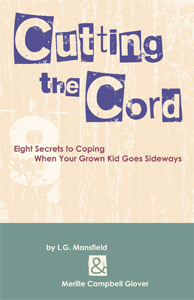For anyone struggling with difficult grown kids and looking for effective mechanisms to cope with your disappointment or feelings of guilt, please visit my new blog:
Tag: difficult grown kids
Coping with Difficult Grown Kids
Parenting is a daunting and mysterious task. As mothers and fathers, we spend the better part of a lifetime raising our children—some of us focused unwaveringly on being an exceptional parent, others merely scratching the surface. But no matter how differently parents approach the responsibility of launching a child into adulthood, one fact remains constant: we rarely know from day to day if what we are fostering in our children will grow to be straight and true.
Sometimes, the circumstances of growing up seem to have little effect on the end result. Even in the healthiest of families, some children turn out unexpectedly. They can be unmotivated, uncaring, or destined for trouble. Let’s face it: whether or not we are good parents, any of us can end up with a not-so-good kid.
Perhaps a child simply doesn’t turn out the way his parents had hoped, due either to his own bad decisions or to unrealistic parental expectations. Perhaps he drinks too much. Perhaps he breaks the law.
Maybe she makes poor choices in partners that will limit her future happiness. Maybe she flits from job to job. Maybe she’s moved back home again and expects you to raise your grandchildren.
Depending upon the severity of the negative behavior, parents’ reactions can range from simple concern to acute suffering…from I’m-okay-with-it-now disappointment to I-can-never-show-my-face-in-public-again humiliation. In all cases, learning to adjust is a critical component of the healing process.
My newest book—Cutting the Cord: Eight Secrets to Coping When Your Grown Kid Goes Sideways—offers both the parent’s and the clinician’s perspectives on how to understand and cope with the necessary transitions when serious trouble strikes. It explains how parents must move into a less caretaking role and continue the love no matter what. It welcomes troubled mothers and fathers into the hearts of other parents who have journeyed through the same challenges and emerged healthy and intact.
Like a gentle—and sometimes unexpectedly raucous—conversation with a trusted confidante, this book explores the thoughts and feelings of parents whose grown kids have posed difficult challenges. Some of the insights offer encouragement. Some make you laugh. Others help you pierce the wall of guilt and welcome hope for the future. All provide the sincerity, warmth, and compassion that you expect from a good and caring friend.
To purchase the book, I invite you to visit:

